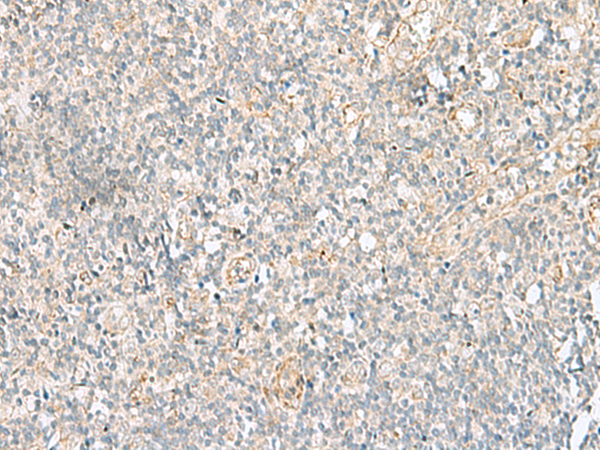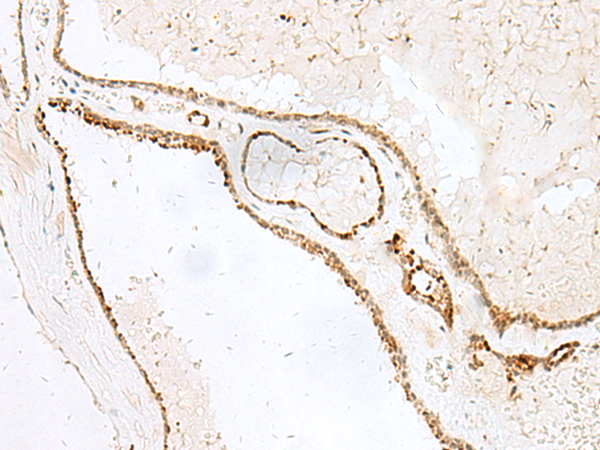

| WB | 咨询技术 | Human,Mouse,Rat |
| IF | 咨询技术 | Human,Mouse,Rat |
| IHC | 1/40-1/200 | Human,Mouse,Rat |
| ICC | 技术咨询 | Human,Mouse,Rat |
| FCM | 咨询技术 | Human,Mouse,Rat |
| Elisa | 1/5000-1/10000 | Human,Mouse,Rat |
| Aliases | HSPC210; C14orf129 |
| Host/Isotype | Rabbit IgG |
| Antibody Type | Primary antibody |
| Storage | Store at 4°C short term. Aliquot and store at -20°C long term. Avoid freeze/thaw cycles. |
| Species Reactivity | Human, Mouse, Rat |
| Immunogen | Fusion protein of human GSKIP |
| Formulation | Purified antibody in PBS with 0.05% sodium azide and 50% glycerol. |
+ +
以下是基于假设的3篇可能与GSKIP抗体相关的文献示例(注:具体文献可能需要根据实际数据库检索验证):
---
1. **文献名称**:*GSKIP regulates Wnt/β-catenin signaling by interacting with GSK3β and Dishevelled*
**作者**:Chen Y, et al.
**摘要**:该研究揭示了GSKIP作为支架蛋白,通过其N端结构域与GSK3β结合,调控Wnt信号通路。作者使用特异性抗体验证了GSKIP在细胞质中的定位,并证明其缺失导致β-catenin异常积累,促进肿瘤生长。
2. **文献名称**:*Development of a monoclonal antibody against human GSKIP for functional studies in neuronal differentiation*
**作者**:Tanaka K, et al.
**摘要**:本研究开发了一种高特异性抗人GSKIP的单克隆抗体,通过免疫沉淀和Western blot验证其有效性。实验发现,GSKIP在神经干细胞分化中通过调控GSK3β活性影响轴突形成。
3. **文献名称**:*GSKIP modulates mitochondrial function via interaction with PKA in cardiac hypertrophy*
**作者**:Wang L, et al.
**摘要**:文章发现GSKIP与蛋白激酶A(PKA)相互作用,影响线粒体能量代谢。使用GSKIP抗体进行免疫荧光显示其在线粒体周围富集,提示其在心肌肥厚病理中的潜在作用。
---
**注意**:以上文献为示例性质,实际引用需以权威数据库(如PubMed)检索结果为准。若需精准文献,建议补充GSKIP研究的具体方向(如疾病模型或信号通路)。
GSKIP (Glycogen Synthase Kinase 3β Interaction Protein) is a regulatory protein that interacts with GSK3β, a serine/threonine kinase involved in multiple signaling pathways, including Wnt/β-catenin, insulin, and Hedgehog. Discovered in the early 2000s, GSKIP acts as a scaffold protein, modulating GSK3β activity by influencing its substrate specificity and subcellular localization. It plays a critical role in cell proliferation, differentiation, and apoptosis by regulating β-catenin stability and downstream transcriptional activity in the Wnt pathway. Dysregulation of GSKIP has been linked to diseases such as cancer, neurodegenerative disorders, and metabolic syndromes, highlighting its therapeutic potential.
Antibodies targeting GSKIP are essential tools for studying its expression, interactions, and functional mechanisms. They enable detection via techniques like Western blotting, immunoprecipitation, and immunofluorescence, aiding research into GSKIP's role in disease pathogenesis. For instance, altered GSKIP levels in tumors or brain tissues have been associated with abnormal Wnt signaling, making it a biomarker candidate. These antibodies also support drug discovery by screening molecules that modulate GSKIP-GSK3β interactions. Despite progress, challenges remain in understanding tissue-specific functions and post-translational modifications of GSKIP, driving ongoing research to refine antibody specificity and applications.
×